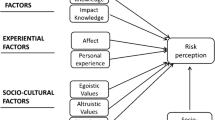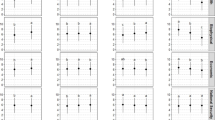Abstract
As New Zealand moves towards implementing measures under its new zero carbon climate change act, it is increasingly important to understand the differences in public perceptions of climate change risks, as these can significantly foster or hinder climate change decision-making. While there is some existing research on a range of stakeholder views, beliefs and values pertaining to climate change risks in New Zealand, this paper argues for a more nuanced appreciation for who the ‘public’ is in the country. In an increasingly multi-cultural society, cultural differences across local population groups in climate change risk perception as well as in terms of their varying information needs is relevant to improved science communication and ultimately to improved climate change planning and decision-making.



Similar content being viewed by others
Data availability
Data referenced in this report can be accessed from the New Zealand government’s publicly available repository of statistics at https://www.stats.govt.nz/.
Notes
The Act came into effect on 14 November 2019
This typology builds on a ‘group-grid’ theory previously proposed by Douglas (1970) that focussed on the individual and each person’s social position inside or outside a social group. See Stoltz (2014) for a fuller context to the development of Douglas and Wildavsky’s grid/group typology of worldviews
Classifications such as ‘Pasifika’ and ‘Asian’ themselves house huge variance within themselves and require further dis-aggregation
References
Ballew M, Maibach E, Kotcher J, Bergquist P, Rosenthal S, Marlon J, Leiserowitz A (2020) Which racial/ ethnic groups care most about climate change? Yale University and George Mason University, New Haven, CT, Yale Program on Climate Change Communication
Clahsen SCS, van Kamp I, Hakkert BC, Vermeire TG, Piersma AH, Lebret E (2018) Why do countries regulate environmental health risks differently? A theoretical perspective Risk Analysis. https://doi.org/10.1111/risa.13165
Douglas M (1970) Natural symbols: explorations in cosmology. Cresset Press, Barrie & Rocklieff
Hodder R, Krupp J (2017) The new Zealanders. The New Zealand Initiative, Wellington
Kahan DM, Braman D (2006) Cultural cognition of public policy. Yale J Law Public Policy. 24: 147-170. SSRN 746508
Kahan DM (2010) Fixing the communications failure. Nature 463(7269):296–297
Kahan DM (2012) Cultural cognition as a conception of cultural theory of risk. In Roeser et al (eds) Handbook of Risk Theory, pp. 725–759
Kahan DM, Peters E, Wittlin M, Slovic P, Ouellette LL, Braman D, Mandel G (2012) The polarizing impact of science literacy and numeracy on perceived climate change risks. Nat Clim Chang 2:732–735
King DNT, Skipper A, Tawhai WB (2008) Maori environmental knowledge of local weather and climate in Aotearoa – New Zealand. Clim Chang 90(4):385–409
Lawrence J, Blackett P, Cradock-Henry N, Flood S, Greenaway A, and Dunningham A (2016) Synthesis report RA4: enhancing capacity and increasing coordination to support decision making. Climate change impacts and implications (CCII) for New Zealand to 2100. MBIE contract CO1X1225
Leiserowitz A, Maibach E, Rosenthal S, Kotcher J, Bergquist P, Gustafson A, Ballew M, and Goldberg M (2019) Climate activism: beliefs, attitudes, and behaviours. November 2019. Yale University and George Mason University. New Haven, CT: Yale Program on Climate Change Communication
Māori Crown Relations Unit (2018) Guidelines for engagement with Māori. https://tearawhiti.govt.nz/assets/Maori-Crown-Relations-Roopu/6b46d994f8/Engagement-Guidelines-1-Oct-18.pdf
Mulgan RG (1990) Maori, Pakeha and democracy. Press, Oxford University
Morello-Frosch R, Pastor M, Sadd J, Shonkoff S (2009) The climate gap: inequalities in how climate change hurts Americans & how to close the gap. USC Program for Environmental & Regional Equity, CA
Procter J, Kenney C, Black T, Harmsworth G, Saunders WSA, King D, Awatere S, Potangaroa R (2018) Methods to build resilience in indigenous communities: a case study from Maori, New Zealand, in European Geosciences Union general assembly 2018, Vienna, Austria, 8–13 April 2018. Gottingen, Germany
Ritchie JE (1992) Becoming bicultural. Daphne Brasell Associates Press, Wellington, Huia Publishers
Schneider P, Glavovic B, Farrelly T (2017) So close yet so far apart: contrasting climate change perceptions in two “neighboring” coastal communities on Aotearoa New Zealand’s Coromandel peninsula. Environments Vol 4(3):65. https://doi.org/10.3390/environments4030065
Slovic P (ed) (2000) Risk, society and policy series: the perception of risk. London: Sterling. Earthscan Publications, VA
Singham M (2006) Multiculturalism in New Zealand – the need for a new paradigm. Aotearoa ethnic network journal. Vol 1(1):33–37
Smith H (2020) Collaborative strategies for re-enhancing hapū connections to lands and making changes with our climate. The contemporary Pacific. University of Hawai’i Press Volume 32(1):21–46. https://doi.org/10.1353/cp.2020.0002
Strategic Social Policy Group (2008) Diverse communities – exploring the migrant and refugee experience in New Zealand. Ministry of Social Development, Wellington
Stoltz DS (2014) Diagrams of theory: Douglas and Wildavsky’s grid/ group typology of worldviews. Blogpost June 4, 2014. https://www.dustinstoltz.com/blog/2014/06/04/diagram-of-theory-douglas-and-wildavskys-gridgroup-typology-of-worldviews. Retrieved 2nd November 2020
Sunstein CR (2007) On the divergent American reactions to terrorism and climate change. Columbia law review. Vol. 107(2):503–557
Tansey J, O’Riordan R (1999) Cultural theory and risk: a review. Health, risk & society. Vol. 1(1):71–90
Terruhn J, and Rata A (eds) (2019) Capturing the diversity dividend? Diversity matters in Aotearoa/ New Zealand. New Zealand Population Review, Volume 45
Treasury (2018) Living Standards Framework. https://treasury.govt.nz/information-and-services/nz-economy/higher-living-standards/our-living-standards-framework
Walton M, Johnston DM, Leonard GS, Gray W, Bell R, Paton D (2004) The Waikato weather bomb: understanding the impact. Wellington, New Zealand Climate Change Office
Ward C, Masgoret A (2018) Attitudes towards immigrants, immigration, and multiculturalism in New Zealand: a social psychological analysis. International migration review. Vol 42(1):227–248
Wildavsky A, Douglas M (1982) Risk and culture: an essay on the selection of technological and environmental dangers. University of California Press
Yong S (2018) An Asian perspective and the new Zealand Treasury living standards framework. Auckland University of Technology. New Zealand discussion paper 18/10. September 2018
Funding
This research is supported by funding from the New Zealand government’s Strategic Science Investment Fund.
Author information
Authors and Affiliations
Contributions
Single author.
Corresponding author
Ethics declarations
Conflict of interest
The author has no conflicts of interest relevant to the content of this article to declare.
Code availability
Not applicable.
Additional information
Publisher’s note
Springer Nature remains neutral with regard to jurisdictional claims in published maps and institutional affiliations.
The author is a Senior Social Scientist at GNS Science, Avalon, Lower Hutt. Dr. Talwar is an environmental lawyer (LLM, London School of Economics) and social scientist (PhD, University of Cambridge) working on a range of issues at the interface of environment and development policy. Please contact s.talwar@gns.cri.nz for queries.
Glossary
- Aotearoa
-
Māori name for the country New Zealand
- Hapū
-
Sub-tribe
- Iwi
-
Tribe
- Māori
-
Indigenous person of Aotearoa – New Zealand
- Mātauranga Māori
-
Māori knowledge. Body of knowledge originating from Māori ancestors, including the Māori world view and perspectives, Māori creativity and cultural practices.
- Pasifika
-
Refers to migrants and descendants of migrants from the Polynesian nations of the Cook Islands, Tonga, Niue, Samoa, Tuvalu, Tokelau, who now call New Zealand home.
- Rangatira
-
Māori chief or leader
- Whānau
-
Extended family, family group
- Whenua
-
Land, country, earth
- Tangata whenua
-
People of the land
- Te Reo Māori
-
Māori language
- Te Tiriti o Waitangi
-
The Treaty of Waitangi is an agreement in Te Reo Māori and English that was signed in 1840 by the British Crown and about 540 Māori rangatira.
Rights and permissions
About this article
Cite this article
Talwar, S. Culturally mediated perceptions of climate change risks in New Zealand. Climatic Change 164, 12 (2021). https://doi.org/10.1007/s10584-021-02966-9
Received:
Accepted:
Published:
DOI: https://doi.org/10.1007/s10584-021-02966-9




